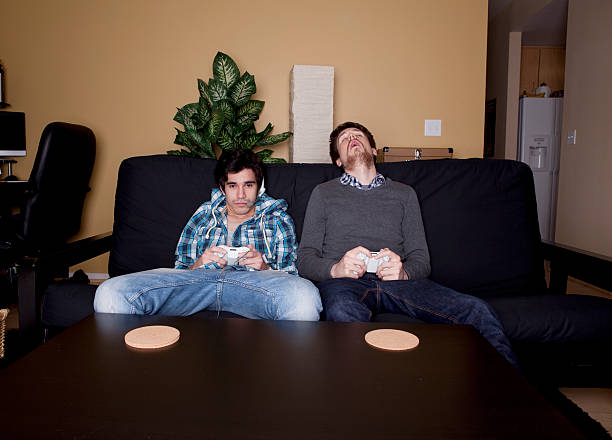Why has gaming become boring
Gaming has revolutionized over the past few decades, from the days of early 8-bit consoles, to the interactive and immersive gaming experiences available on modern consoles and PCs.
Despite this, many gamers have expressed feeling a sense of boredom with the gaming landscape, despite the wide array of genres, gameplay styles, and ever-evolving graphics.
In this blog post, we will be exploring why gaming might be feeling a little stale, and whether or not there are any solutions to the problem.
We will look at the possible factors behind why gaming has become boring, ranging from the lack of innovation within the gaming industry, to potential changes in the way people engage with gaming.
We will also offer some insight into how the gaming industry could potentially inject some life back into the gaming experience.
Does gaming get boring as you get older?
This is something that many people are asking themselves as they look back at their gaming experiences in their youth.
As technology advances and games become more visually stunning, immersive and interactive, gamers can often find themselves overwhelmed by the sheer number of choices available to them.
This can lead to feelings of boredom as they try to decide what game to play, or become frustrated when they don’t find the same satisfaction they used to get out of gaming.
Additionally, the cost of gaming has become more expensive over the years, which can limit the amount of gaming many people can enjoy.
This can be frustrating, as it can lead to a feeling that gaming has become too expensive and not as worthwhile as it used to be.
Furthermore, as gaming becomes more prevalent and accessible

Why do video games feel boring now?
One possible reason is that game developers have failed to keep up with the ever-changing tastes of gamers.
As the gaming industry has grown, so have the expectations of gamers. Gamers now expect more immersive and engaging experiences than ever before.
Developers are often unable to keep up with the evolving tastes of gamers, leading to stale and repetitive gameplay.
Another reason why gaming has become boring is because of the over-saturation of the market. With so many games being released every year, it is easy for developers to get lost in the shuffle.
Players are often left with a plethora of games to choose from that all look the same and offer little in the way of innovative gameplay.
This can make it difficult for developers to stand out and create
What to do when gaming gets boring?
One of the best ways to combat boredom in gaming is to try something new.
Try a different genre of game or explore a game you haven’t played before. Many gamers find that they become bored with one type of game and need to switch it up.
Playing with friends or joining a gaming community can also help to keep gaming fun and interesting. Additionally, some gamers find that taking a break from gaming can help them to come back with a fresh perspective and renewed enthusiasm.
Taking a break can be as simple as taking a few days off or setting a gaming schedule to ensure that gaming doesn’t become tedious.

Why am I losing interest in video games?
There are a few reasons why I believe this is happening. Firstly, games are becoming increasingly repetitive and formulaic.
Developers are rehashing old content and saturating the market with the same type of games. This is making games less exciting and more predictable.
Additionally, the amount of competition has risen, leading to game companies focusing on making games for a wide variety of players, leaving those who desire more complex and challenging experiences out in the cold.
Finally, the cost of video games has risen significantly in recent years, making it difficult to keep up with the latest releases. All these factors have contributed to my waning interest in video games.
Why do video games get boring as you get older?
This is a question that many gamers have asked themselves. It is likely that the same games that you enjoyed when you were younger just no longer hold your interest.
The same simple level designs, the same basic game mechanics, and the same limited choices in combat can all lead to a feeling of boredom with gaming.
Additionally, as you age, you become more aware of the time you spend gaming and the diminishing returns that come from it.
If you continue to invest time and money into the same video games, you may find that you stop wanting to play them altogether.
Is there a decline in gaming?
The answer to this question is a bit complicated. On one hand, there are a few indicators that suggest that gaming has declined in recent years.
For example, game sales have been reported to be lower than ever before.
Additionally, the number of people playing games on consoles has significantly decreased. On the other hand, the growth of mobile gaming has been exponential, meaning that the overall number of people playing games is still increasing.
Therefore, it is difficult to definitively answer whether gaming has declined or not.

Why are video games boring now?
It is difficult to pinpoint a single factor as the primary cause of why video games have become boring.
The industry has changed drastically in the past few decades, incorporating many different advancements in technology, graphics and gameplay mechanics.
Many of these changes have made gaming more immersive, intense and realistic, but in some cases, this can also lead to a sense of repetition and fatigue. T
he same types of games, with similar gameplay, can become tedious after a while. Additionally, the market has become saturated with countless sequels and copycat titles, making it difficult to find something truly unique and exciting.
As a result, gamers can become easily bored and uninterested in the selection of titles available.
Does gaming make us lazy
In recent years, there has been some debate over whether or not gaming can make people lazy and unmotivated.
While some may argue that it can divert people from accomplishing their goals and can act as a form of escapism, there is also substantial evidence that gaming can actually have a positive effect on people’s lives.
For instance, research has shown that gaming can improve problem-solving skills, foster collaboration and teamwork, and enhance creativity.
Additionally, playing video games can help reduce stress, provide an outlet for people’s feelings, and even promote physical activity thanks to the increasing popularity of motion-sensing gaming consoles.
Ultimately, it’s up to each individual to decide how they want to use

Why have i lost my interest in gaming?
The answer to this question is complex, but there are several possible explanations. First, the current gaming landscape is saturated with the same types of games.
Many of these games are sequels or remakes of earlier titles, offering little in terms of innovation or originality.
This can lead to a feeling of boredom, as players are constantly presented with the same types of experiences. Second, the gaming industry has become so commercialized, with developers focusing more on profits than player experience.
This has led to a decline in the quality of games released, with developers often cutting corners or offering an incomplete experience.
Finally, the gaming industry can be incredibly competitive, with players feeling the pressure to stay ahead of the curve. This pressure can be overwhelming,
Is the golden age of gaming over?
The golden age of gaming was a time of wonder and excitement, when the technology and ideas behind gaming were so fresh and new that it was a completely new sensation.
However, as the industry has grown, the same ideas, concepts, and technology have been recycled so many times that the excitement of gaming has begun to wear thin.
The lack of innovation in the industry has meant that the same ideas are being used over and over again, and gamers are becoming bored with the same concepts and gameplay.
Additionally, the gaming industry has become less creative and more focused on what will bring in the most money rather than what will be the most fun and engaging.
This shift in the industry has meant that gaming has become more boring than ever before.

Lack of innovation
Gaming has become an increasingly stagnant industry due to a lack of innovation.
Developers are largely relying on the same formulas and mechanics that gamers have seen for years, meaning that the experience can often become quite stale.
This lack of creativity has also led to developers relying on sequels, remasters, and spin-offs as opposed to creating something entirely new.
This lack of innovation has left many gamers feeling uninspired, and in some cases, even bored with the gaming experience.
Repetitive gameplay
In recent years, many video games have begun to include repetitive gameplay within them.
This means that instead of creating new levels and stories for players to explore, developers will simply copy the same level over and over again with slight variations.
This can be incredibly monotonous for gamers, as they are faced with the same objectives and have to complete the same levels multiple times.
The more the gameplay is repeated, the more boring it becomes, eventually leading to gamers becoming frustrated and disinterested in the game.
Uninspired DLC
The trend of releasing downloadable content (DLC) has also had a detrimental effect on gaming. Companies are using this as a way to make more money, but often the content isn’t worth the price.
Too often, it’s simply a few extra levels or a new character, with little to no effort put into creating something new and exciting.
This has caused people to become uninspired to keep playing and in some cases, turned them off of the game entirely.
Unfulfilled promises
The fourth reason why gaming has become boring is because of unfulfilled promises. Developers are constantly making false promises and overpromising the content of their games.
They make grandiose claims about the game’s potential or features, only to deliver something much less than advertised.
This leads to disappointment, as gamers feel cheated out of the experiences they were promised. As a result, many gamers have become cynical about the games they play and the promises developers make.

Constant patches and updates
One of the major reasons why gaming has become boring is the constant need for patches and updates.
With most games now requiring players to download and install updates and patches constantly, it can become tedious and time consuming.
Furthermore, these updates may be of varying sizes, so players may find themselves waiting for hours for their game to download.
This can take away from the fun and excitement of playing a game and make gaming become more of a chore than an enjoyable activity.
Unbalancing of multiplayer
One of the major problems that has caused gaming to become boring is the unbalancing of multiplayer games. Unbalancing refers to when one team or individual has an unfair advantage over the other.
This can occur in games with variable items, such as weapons, armor, and other items, when one team or individual has access to better items or has the ability to upgrade more quickly.
Unbalancing can also occur when some players have more knowledge of the game or better skills, leading to a situation where one team or individual has a difficulty playing against the other.
Unbalancing can make games boring or frustrating, depending on the skill level of the player.
Unnecessary paid microtransactions
One of the main reasons why gaming has become so boring is unnecessary paid microtransactions. Microtransactions are small payments made by players to unlock extra content or progress in games.
These transactions often have no bearing on the actual gameplay, yet developers will add them as a way to make more money.
This can be incredibly annoying for gamers, as it makes it difficult to make progress without spending money.
Moreover, it distracts from the actual game, which can make the experience of playing less enjoyable.
Repetitive monetization models
One of the main reasons why gaming has become boring is the reliance on repetitive monetization models.
Many gaming companies rely on microtransactions, in-app purchases, and loot boxes to generate additional revenue. These strategies are often used in the same game, which can make the experience feel very stale and repetitive.
Players are also often asked to pay for additional in-game content.
This can lead to gamers feeling like they have to pay for the content they want, or risk being left behind.
This leads to an overall feeling of discontentment among gamers, as it detracts from the fun of the game.

ConclusionsWhy has gaming become boring
To conclude, the gaming industry has become stagnant due to a lack of innovation and the over-saturation of similar games.
Developers should focus on creating unique experiences that can stand out from the crowd. This can be achieved by taking risks and developing games that have never been seen before.
With the right mix of innovation and creativity, the gaming industry can once again become a destination for memorable experiences.




Leave a Reply
You must be logged in to post a comment.